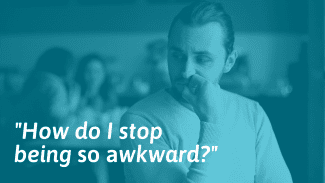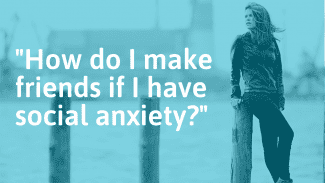“Whenever I socialize, I start obsessing about what others think of me. I worry about what I’m going to say next and get really self-conscious. Why do I overthink every social situation?”
This question hit home since I’m an overthinker myself. Over the years, I’ve learned methods to overcome over-analyzing everything.
In this article, you’ll learn what causes overthinking, how to have more enjoyable social interactions, and how to stop overthinking past conversations.
Sections
Overthinking social situations
Here are several proven techniques for how to stop overthinking social situations:
1. Identify your underlying causes
Social anxiety: Worrying excessively about your social skills and what people think of you is common in social anxiety disorder (SAD). You can take a screening test for SAD online.
Shyness: Shyness isn’t a disorder. However, like those with SAD, shy people are worried about being judged in social situations, which can lead to self-consciousness and social overthinking. Almost half the population say they are shy.[1]
Introversion: Introverts are generally prone to overthinking, and this extends to social interactions.[2]
Fear of social rejection: If you are worried that people won’t like you and want to win their approval, you might constantly monitor your behavior to create a good impression. This can be exhausting and lead to overthinking. Fear of rejection may be a big problem for you if you’ve been bullied in the past.
You might also read these overthinking quotes to check how you relate to them in more concrete terms.
2. Realize that most people aren’t paying much attention
We tend to assume that everyone around us notices the things we say and do. This is called the Spotlight Effect.[3] It’s an illusion because most people are much more interested in themselves than anyone else. People will forget your embarrassing moments quickly.
Think back to the last time a friend of yours slipped up in a social situation. Unless it was very recently or had dramatic consequences, you probably can’t remember it. Remembering this can help you feel less anxious about making mistakes.
3. Take improv classes
Improv classes force you to interact with people on the spur of the moment. You don’t have time to overthink what you are doing or saying. When you carry this habit into your everyday life, your social interactions will feel smoother. Look for classes at your local community college or theater group.
I attended improv classes for over a year and it helped me immensely.
You’ll probably feel silly at first, but you won’t have a chance to dwell on how anxious you feel. Sometimes a scene or exercise will go wrong, but that’s part of the process. You’ll learn that it’s OK to look silly in front of other people.
4. Deliberately do things or say things “wrong”
If you often overthink because you’re afraid of looking foolish, try messing up a few times on purpose. You’ll quickly learn that nothing terrible will happen. Once you realize that everyday mistakes are no big deal, you probably won’t feel so self-conscious in social situations.
For example:
- Mispronounce a drink when ordering it in the coffee shop
- Ask the same question twice in a conversation
- Arrive at a social event 10 minutes late
- Act slightly clumsy by dropping something
- Pretend to lose your train of thought in the middle of a sentence
Psychologists call this “exposure therapy”.[12] It’s when we expose ourselves to our fears. When we realize that the outcome wasn’t as bad as we thought, we don’t worry as much about it.
5. Challenge your assumptions
Overgeneralizing is an example of what psychologists call a cognitive distortion, also known as a thinking error.[4] If you overgeneralize, you focus on one mistake and jump to the conclusion that it says something meaningful about you.
For example, if no one laughs at a joke you make and you think, “No one ever laughs at my jokes, and I’m never funny,” that’s an overgeneralization.
The next time you make an overgeneralization, ask yourself a few questions:
- “Is this a helpful thought to have?”
- “What’s the evidence against this thought?”
- “What would I say to a friend who made this overgeneralization?”
- “Can I replace this with more realistic thought?”
When you stop overgeneralizing, you will probably spend less time obsessing over your mistakes because you know they don’t reflect on you as a person.
6. Stop relying on other people for your self-worth
If your main goal in every social situation is to make other people like you, you’ll probably feel self-conscious and start overthinking everything you do and say. When you learn to validate yourself, it’s often easier to relax and be authentic around others. You’ll also be less afraid of rejection because you don’t need anyone else’s approval.
You can learn to value and accept yourself by raising your self-esteem. Try:
- Focusing on what you do well; consider keeping a record of your achievements
- Setting challenging yet realistic personal goals that have meaning to you
- Limiting the amount of time you spend comparing yourself to other people; this may mean cutting down the amount of time you spend on social media
- Be of service to others; volunteering can improve your self-esteem[5]
- Exercise regularly, eat well, and get enough sleep; self-care is linked to self-esteem[5]
7. Don’t take other peoples’ behavior personally
Unless they tell you otherwise, don’t assume that you’ve done something wrong when someone is rude to you or behaves oddly. Taking things personally can lead to overthinking.
For example, if your manager is usually chatty and friendly but only gives you a quick “Hi” one morning before rushing off, you might think things like:
- “Oh no, I must have done something to upset her/him!”
- “She/he doesn’t like me anymore, and I don’t know why. This is awful!”
In this type of situation, think of at least two alternative interpretations for the other person’s behavior. To continue with the example above:
- “My manager might be under a lot of stress because our department is busy right now.”
- “My manager might be having serious problems outside of work, and their mind isn’t on their job today.”
With practice, you’ll stop overanalyzing every awkward social encounter.
8. Realize that you can’t tell what someone is thinking by overanalyzing their body language
Research shows that we tend to overestimate our ability to decipher body language.[6] Attempting to work out what someone is secretly thinking and feeling isn’t a good use of your mental energy.
Try not to make judgments based on a gut feeling, posture, facial expression, or gestures. Instead, focus carefully on what they are saying, what they do, and how they treat others as you get to know them better. Until someone has shown that they are untrustworthy or unkind, given them the benefit of the doubt.
9. Try regular mindfulness meditation
Practicing mindfulness meditation (MM) helps you stay in the present moment and detach from your negative thoughts and judgments. Research shows that it reduces overthinking and rumination in people with anxiety disorders.[9]
Mindfulness practices can also make you less self-critical and improve your self-compassion. This is useful for people with social anxiety disorder who tend to beat themselves up for making small mistakes.[10]
There are lots of free and paid apps available to help you get started, including Smiling Mind or Insight Timer. You don’t have to meditate for long to see the benefits. Research shows 8 minutes can be enough to stop you ruminating.[11]
Overthinking conversations
“I find myself thinking too much about what I should say next. Talking to people is no fun for me because I’m always overthinking and worrying.”
1. Learn some conversation openers
By deciding in advance what kind of thing you’ll say at the beginning of a conversation, you’ve already done most of the work. Instead of overthinking and waiting for inspiration, you can do one of the following:
- Talk about a shared experience (e.g., “That exam was tough. How did you find it?”)
- Share an opinion about your surroundings, and ask for their thoughts (e.g., “That’s a strange painting they’ve hung up over there. It’s cool though. What do you think?”)
- Give them a sincere compliment (e.g., “That’s an awesome t-shirt! Where did you get it?”)
- If you are at a function, talk about who you know (e.g., “Isn’t it a beautiful wedding? How do you know the couple?”)
You can also memorize a few opening lines. For example:
- “Hi, I’m [Name]. How are you?”
- “Hey, I’m [Name]. What department do you work in?”
- “Great to meet you, I’m [Name.] How do you know the host?”
See this guide on how to start a conversation for more ideas.
2. Focus outwards
If you concentrate on what the other person is saying, you won’t have to think too much about how you’ll respond because your natural curiosity will help you come up with questions.
For example, if someone tells you that they are feeling nervous today because they have a job interview, you might ask yourself:
- What kind of job are they going for?
- Why are they deciding to change their job right now?
- If they get the job, will they have to move?
- Is there any special reason they want to work for that particular company?
From there, it’s easy to think of questions. For example, you could say, “Oh, that sounds exciting! What type of work does the job involve?”
3. Give yourself permission to say trivial things
You don’t have to be profound or witty all the time. If you put yourself under pressure to perform, you’ll start overthinking everything you do and say.
When you are getting to know someone, you will probably have to start with some small talk. Small talk isn’t about impressing the other person. It’s about showing that you are trustworthy and understand the rules of social interaction.
Socially skilled people are happy to make simple remarks about their surroundings or talk about straightforward topics like the weather or local events. When you have established a rapport, you can move to more interesting topics. It’s far better to make safe, trivial conversation than to stay silent.
4. Socialize with people who share your interests
Taking part in a class or hobby group where everyone is united by the same interest can make it easier to find things to talk about. Just like paying close attention to what someone is saying can stop you from overthinking, focusing on what you have in common can help a conversation flow. Look on meetup.com, Eventbrite, or on your local community college’s website for classes and meetups.
5. Talk to as many people as possible
Make small talk and conversation a regular part of your day to day life. Like any other skill, the more practice you get, the more natural it becomes. As you gain confidence, you will probably overthink less because you’ll be able to see the bigger picture: a single conversation doesn’t matter.
Start small. For example, challenge yourself to say “Hi” or “Good morning” to a coworker, neighbor, or store clerk. You can then move on to simple questions, like “How is your day going?” See this guide to good small talk questions for more ideas.
Overanalyzing past conversations
“How do I stop replaying events in my mind? I spend hours rehashing things I’ve said and done.”
1. Come up with an action plan
Ask yourself, “Is there something practical I can do to make myself feel better about this situation?”[7] You can’t go back in time and have the conversation again, but you may be able to learn or practice social skills that will help you in the future.
For example, let’s say you are analyzing a conversation that became awkward because you ran out of things to talk about. Memorizing a few topics or opening lines could help you avoid a similar situation in the future.
Deciding on a solution can give you a sense of control and closure. This can help you move on.
2. Set aside 15-30 minutes every day to ruminate
Some people find it easier to cut down on rumination if they schedule it.[8] Set a timer and give yourself permission to overanalyze social interactions or conversations as much as you like. You might find it cathartic to write your thoughts down on paper. When the timer goes off, move on to a different activity.
3. Distract yourself when you start overanalyzing
Distractions can break negative thought patterns.[8] Try doing some vigorous exercise while listening to music, losing yourself in a video game, or talking to a friend about something you find interesting. Stimulating your senses can also work well. Have a hot shower, smell a strong scent, or hold an ice cube in your hand until it starts to melt.
Note that distraction doesn’t get rid of the thoughts. It just means that you are redirecting your attention. If your mind starts to dwell on the past, acknowledge that you’re ruminating again and gently bring your attention back to the present.
4. Ask one other person for their perspective
A good friend can help you decide what to say differently next time around. Choose someone who is socially skilled, compassionate, and an attentive listener.
However, you need to be careful when analyzing a conversation with someone else. If you talk about it for too long, you’ll start ruminating together.[8] This is called “co-ruminating.” Discuss it only once, and for no more than around 10 minutes. That’s long enough to get their opinion and reassurance without falling into co-rumination.
You might like to read this article if you feel you might be developing anxiety after socializing.








